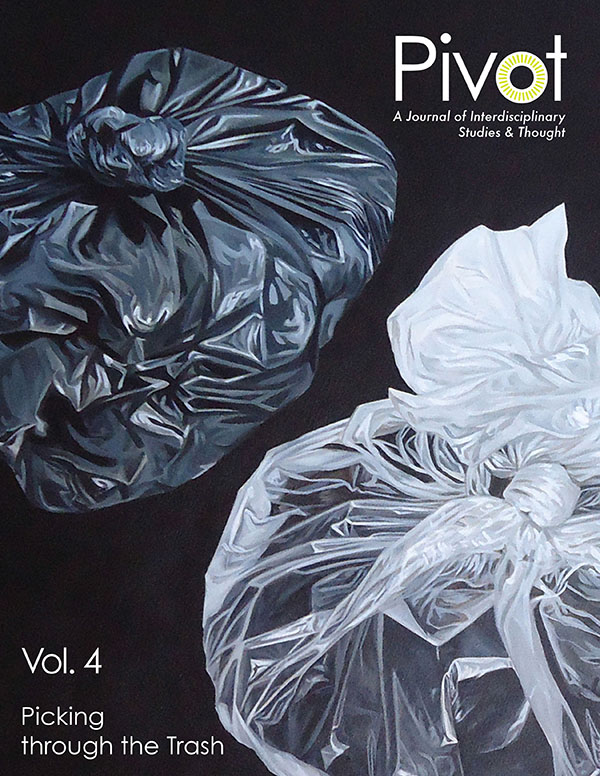From the Ethos of Housekeeping to the Doctrine of Ecology: Paradigm-shifts in the Politics of Domestic Garbage-Disposal
DOI:
https://doi.org/10.25071/2369-7326.39573Abstract
The aim of this article is to illuminate the political dimensions of modern waste disposal practices by comparing the representation of garbage, filth, hygiene, health and efficiency during the emergence of the modern kitchen at the beginning of the 20th century with today’s discourse of ecology, recycling and global responsibility. At issue will be mechanisms of identifying, collecting and handling trash in modern homes as well as the implied hierarchical order of decay and growth, that are set in very specific contexts of normalization and deviance. With regard to the notion of an ‘aesthetic regime’ as developed by Jacques Rancière, an assumption the paper both works with and tries to make plausible is that political matters not only emerge in the realm of deliberate action and public debate, but are fundamentally played out in the realm of sensual perception, notably through everyday ways of seeing as embedded in mundane practice and discourse.References
Bennett, Jane. Vibrant Matter: A Political Ecology of Things. Durham: Duke UP, 2010. Print. DOI: https://doi.org/10.1215/9780822391623
Branham, Kristi. “Hung Out to Dry. Laundry Advertising and the American Woman, 1890–1920.” Home Sweat Home: Perspectives on Housework & Modern Relationships. Eds. Mimi Choi and Elizabeth Patton. Lanham, Maryland: Rowman & Littlefield, 2014. 1–26. Print.
Choi, Mimi and Elizabeth Patton. “Introduction.” Home Sweat Home: Perspectives on Housework & Modern Relationships. Lanham, Maryland: Rowman & Littlefield, 2014. xiii–xxiii. Print.
Cohen, William A. and Ryan Johnson. Filth. Dirt, Disgust, and Modern Life. Minneapolis: U of Minnesota P, 2005. Print.
Corcoran, Steven. “Introduction.” Jacques Rancière. On Politics and Aesthetics. Trans. Steven Corcoran. New York: Bloomsbury Academic, 2013. 1–24. Print.
Cox, Rosie. “Dishing the Dirt. Dirt in the home.” Dirt: The Filthy Reality of Everyday Life. Eds. Elizabeth Pisani, Rose George, Rosie Cox, Virginia Smith, Brian Ralph. London: Profile Books, 2011. 37–73. Print.
Douglas, Mary. Purity and Danger. An Analysis of Concepts of Pollution and Taboo. London: Routledge and Keegan Paul, 1966. Print.
Flagmeier, Renate. “Gebrauchsanweisung für eine Frankfurter Küche im Museum (der Dinge)” Schaukasten: Die Frankfurter Küche. Eine museale Gebrauchsanweisung. Eds. Renate Flagmeier and Werkbundarchiv. Potsdam: Brandenburgisch Universitätsdruckerei und Verlagsgesellschaft, 2012. 9–17. Print.
Frederick, Christine. The New Housekeeping: Efficiency Studies in Home. Garden City, New York: Doubleday, 1919. Print.
Frederick, Christine. Household Engineering: Scientific Management in the Home. Chicago: American School of Home Economics, 1920. Print.
Freeman, June. The Making of the Modern Kitchen: A Cultural History. New York: Berg, 2004. Print.
Heindl, Ines. “Kulinarische Diskurse als Indikatoren sich wandelnder Gesellschaften.” Tatort Küche. Kunst, Kulturvermittlung, Museum: Die Küche als Lebens– und Erfahrungsraum. Schriftenreihe Medien–Kunst–Pädagogik. Eds. Manfred Blohm, Sara Burkhardt und Christine Heil. Flensburg: Flensburg University Press, 2009. 65–78. Print.
Herring, Scott. The Hoarders: Material Deviance in Modern American Culture. Chicago: University of Chicago Press, 2014. Print. DOI: https://doi.org/10.7208/chicago/9780226171852.001.0001
Laporte, Dominique. History of Shit.Trans. Nadia Benabid and Rodolphe el-Khoury. Cambridge, MA: MIT P, 2000. Print.
Lupton, Ellen and Abbott Miller. The Bathroom, the Kitchen and the Aesthetics of Waste. New York: Kiosk, 1996. Print.
Marres, Noortje. Material Participation: Technology, the Environment and Everyday Practice. New York: Palgrave Macmillan, 2012. Print.
Nagle, Robin. Picking Up: On the Streets and Behind the Trucks with the Sanitation Workers of New York City. New York: Farrar, Straus and Giroux, 2013. Print.
Oakley, Ann. Housewife. London: Allen Lane, 1974. Print.
Rancière, Jacques. The Politics of Aesthetics. Trans. Gabriel Rockhill. New York: Continuum, 2006. Print.
Rancière, Jacques. “The Thinking of Dissensus.” in Bowman, Paul and Stamp, Richard (eds). Reading Rancière. New York: Continuum, 2011. Print.
Rancière, Jacques. Dissensus: On Politics and Aesthetics. Trans. Steven Corcoran. New York: Bloomsbury Academic, 2013. Print.
Schneider, Alexandra and Wanda Strauven. “Waste: An Introduction.” NECSUS: European Journal of Media Studies, 2.2 (2013). 409– 418. Print.
Schoonover, Karl. “Documentaries without Documents? Ecocinema and the Toxic.” NECSUS: European Journal of Media Studies, 2.2 (2013). 485–507. Print.
Windmuller, Sonja. Die Kehrseite der Dinge. Müll, Abfall, Wegwerfen als kulturwissenschaftliches Problem. Münster: Lit Verlag, 2004. Print.

